At the Heidelberg Laureate Forum: A Firsthand Account
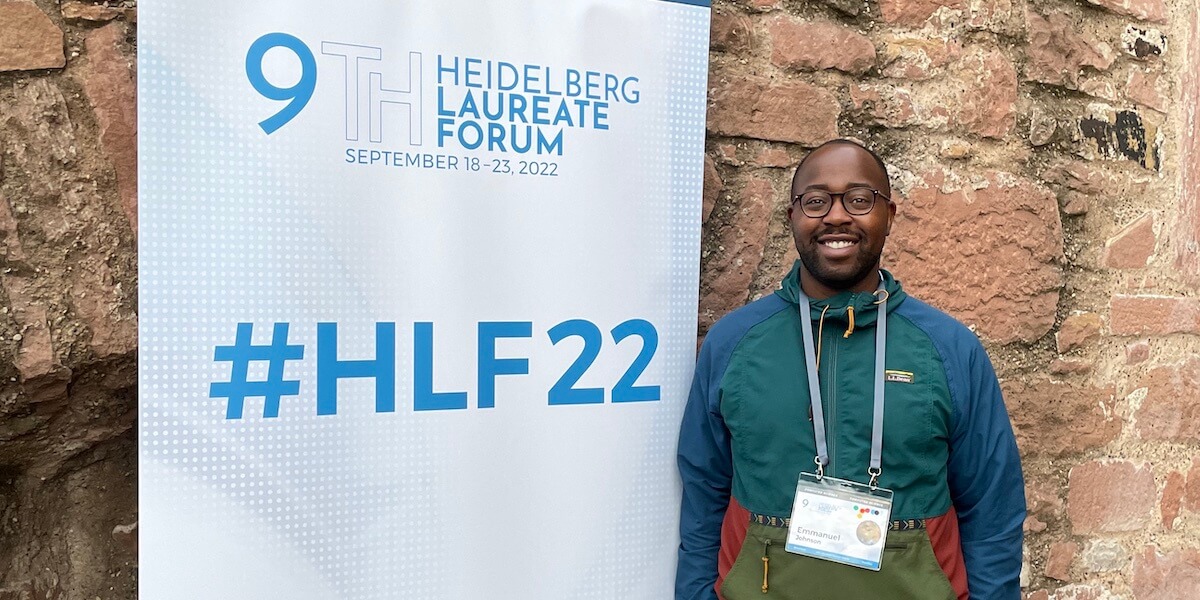
Emmanuel Johnson, a Postdoctoral Research Associate at USC’s Information Sciences Institute (ISI), was recently invited to the Heidelberg Laureate Forum. Here, he recounts his experience.
The Heidelberg Laureate Forum is a weeklong event where the most promising young researchers from around the world in mathematics and computer science meet and network with acclaimed researchers in these disciplines – winners of the Abel Prize, ACM A.M. Turing Award, ACM Prize in Computing, Fields Medal, IMU Abacus Medal and Nevanlinna Prize.
The conference takes place in Heidelberg Germany, at the oldest University in Germany. It was started by Dr. Klaus Tschira, the founder of SAP, as a way for “bright young minds to interact with their scientific role models. “Each researcher must submit an application and is selected by a panel of experts in their field. It is a very competitive process to be selected and being invited to participate was both an exciting and humbling experience.
At the forum, we had various lectures, workshops and panel discussions involving the different laureates and invited guests. We had the opportunity to network and chat with laureates in person during coffee breaks and during small group sessions.
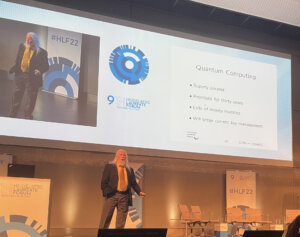
A presentation by Turing Award winner Whitfield Diffie
Stand Out Sessions
There were a few sessions that stood out to me. A lecture from Robert Tarjan about his discovery of the Tarjan algorithm helped me understand how small ideas become big concepts.
The Lindau Laureate lecture by Reinhard Genzel, the 2020 recipient of the Nobel Prize in Physics, gave me a glimpse into how novel innovations build on generations of prior work.
And a conversation I had with Jack Dongarra – whose work in high performance computing was recognized with the 2021 Turing Award – regarding how he views his career and managing egos as he grew in notoriety, was an interesting look at the human aspects of the scientific life and how best to manage one’s career.
Deep Learning and Working Across Disciplines
Later in the week, we had a hot topic discussion on the state of deep learning and AI. Panelists discussed the current challenges in deep learning – an artificial intelligence approach based on an artificial neural network – and how we can ensure it is employed ethically and inclusively. Two of the “Godfathers” of deep learning, Yoshua Bengio and Yann LeCun, joined and it made for a lively discussion around the ethical implications and the responsibilities for the scientists who build these machines.
On the last day, we were hosted at SAP campus, where we heard a talk from Shwetak Patel, a winner of the ACM Prize in Computing. He discussed his work across different fields and encouraged young researchers to think less about how their work fits into academic silos and focus more on cross-disciplinary work solving problems that they care about.
Top Notch Dinner Conversations
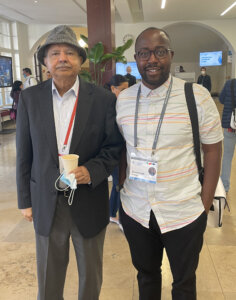
Raj Reddy and Emmanuel Johnson during a coffee break
Each day after our sessions, we proceeded to an activity or dinner. During one of the dinners, I had a chance to meet Dr. Raj Reddy, a pioneer in AI and the recipient of the Turing award in 1994. I enjoyed learning more about his journey as well as the challenges faced in building up a new field. I spoke with him about bringing AI to underrepresented groups and his work for IBM in Senegal doing just that. We also discussed the early days of the Robotics Institute and the work Carnegie Mellon University and the Mastercard Foundation are doing in Africa to drive youth-led digital transformation.
We concluded the forum with a tour of the Heidelberg Castle and dinner there as well. Beyond the laureates, I met a number of incredibly inspiring young researchers in both mathematics and computer science from all over the world. I recall conversations with participants from Ghana, Nigeria, Iran, Sri Lanka, India, and a host of other places. There was truly an international presence at the event. We discussed our research and common interest in mathematics and computer science as well as what the responsibilities of the next generation of researcher is. It was enlightening to get a mixed perspective from so many diverse viewpoints.
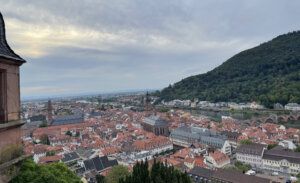
Heidelberg, Germany
My Takeaways
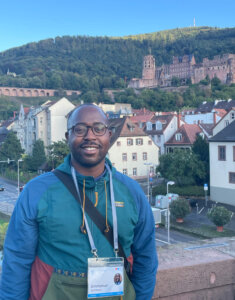
Emmanuel Johnson in Heidelberg, Germany
There were two main takeaways from the forum. The first: pursue the areas of research that you are passionate about because the rest is unpredictable. What we learned from most of the laureates is that they never planned for the work they were doing to have such a huge impact; they just found problems that were really important and that they were passionate about. By pursuing those things, it provided the energy and courage to try new things and pursue more risky ideas, and that is what led to their success.
The next thing I learned is that you can’t chase the problems or fields that are hot right now. The problems of tomorrow would require a different approach than we have today. In order to find those solutions, we must be willing to think differently and that requires more than just mastering the current solutions we have.
Published on October 25th, 2022
Last updated on October 25th, 2022